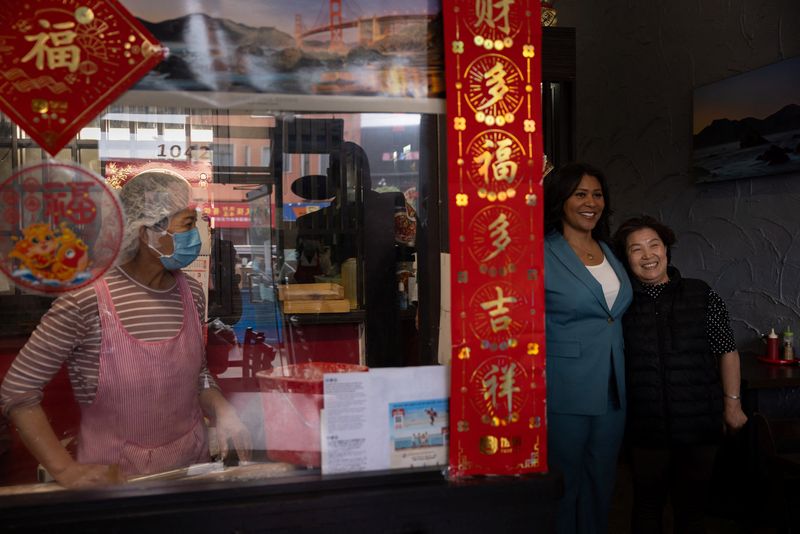Housing crisis, shift to the right define San Francisco mayoral race
2024.10.05 06:26
By Judith Langowski
SAN FRANCISCO (Reuters) – Concerns about housing and crime are dominating San Francisco’s mayoral race, an election that gives voters a chance to choose which path they trust to pull their city out of a slump.
San Francisco has come to represent the challenges faced by many large U.S. cities that have struggled with an uneven economic recovery and rising cost of living since the COVID-19 pandemic.
To critics of its leadership, the city has become caught in what they call a doom loop, characterized by street homelessness and open-air drug markets. Downtown recovery has been slow, with many empty storefronts and low street traffic.
Among major U.S. cities, San Francisco has the highest office vacancy rate at about 32%, according to March 2024 data from real estate company JLL.
Against this backdrop, the famously liberal city has begun a political shift, including ballot measures passed this year that put in place new police surveillance technology and mandatory drug screening for recipients of city public assistance.
Observers widely expect the upcoming mayoral race to reflect the growing popularity of the moderate-centrist wing of the local Democratic party, which saw gains in March elections.
“What voters care about right now are not currently the kind of issues that progressives tend to do well on,” Jason McDaniel, political science professor at San Francisco State University told Reuters.
Starting with early voting on Oct. 7, voters will choose from 13 candidates in an instant-runoff, ranked-choice voting system. Incumbent Mayor London Breed, who has been leading the city since a 2018 special election, has four major opponents, all Democrats. Breed has won the endorsement of the San Francisco Democrats.
An August poll by the San Francisco Chronicle showed Breed leading, followed by moderate Democrats, former interim Mayor Mark Farrell and philanthropist and heir to the Levi’s fortune Daniel Lurie. Two progressive-left candidates, Aaron Peskin and Ahsha Safai, trailed.
The poll showed the top issues among voters were crime and public safety, ahead of housing affordability and homelessness.
‘STARTING TO FEEL BETTER’
A delay in the election may have helped Breed.
A ballot measure passed in 2022 moved local elections in San Francisco to even-numbered years, in part in hopes that linking them to presidential elections will increase turnout.
That meant rather than running for reelection last November, Breed had an extra 12 months to improve perceptions of her leadership.
“Pushing the election back a year, people are starting to feel better about the city”, said McDaniel.
Crime rates have fallen 32% year-over-year, according to the San Francisco Police Department. The drop is partly due to increased police resources and better deployed surveillance technologies, Breed said.
“We have the systems. It’s working the way it should,” Breed said in an interview.
Farrell says far more needs to be done. He promised to hire a new police chief in his first 100 days and said in a debate that he would declare a “fentanyl state of emergency” to access more state and federal resources to fight the scourge of the deadly drug.
Breed’s critics also have taken aim at the slow pace of permitting and building new housing under her administration.
The city is far behind the state mandated housing goals of adding 82,000 new units between 2023 and 2031. Only around 500 new units had received permits by July, according to the U.S. Housing Department, triggering a state law to streamline the approval process.
“Many of our policies have made it very difficult to build, more expensive, and easier for people to oppose housing opportunities when they come to neighborhoods that are traditionally not used to building more housing,” Breed acknowledged.
She said she wants to focus on underutilized areas for new construction while maintaining the fabric of the city. San Francisco is famous for its colorful and quaint Victorian homes.
In a town where the median household income of the more than 800,000 residents is highest among major U.S. cities, homelessness remains intractable. The latest study showed around 8,000 people in the city are homeless, a figure some advocates say undercounts the population.
Breed’s administration has been employing homeless tent sweeps since a June Supreme Court ruling found banning encampments constitutional. Breed has said the sweeps are part of a variety of solutions, including increasing shelter capacity and busing homeless people to family or networks outside the city.
Peskin, one of the progressive-left candidates, said people are simply being moved from one neighborhood to another.
Lurie, who founded a nonprofit aimed at reducing poverty, said Breed hasn’t done enough to keep people off the streets.

Lurie has so far outspent all other candidates, contributing more than $6 million from his own wealth. Contributors to a committee supporting his run include Jan Koum, founder of messaging app WhatsApp, and other tech executives and venture capitalists.
Homelessness is “against the law,” Lurie said, “and it’s not compassionate, and it’s not humane to allow people to stay on our streets.”








